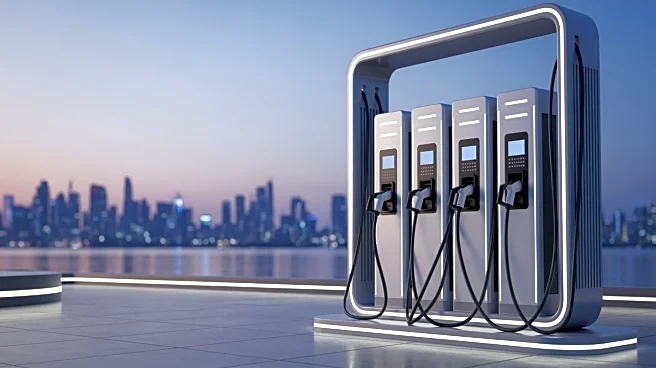What's Happening?
Rivian Automotive is set to lay off approximately 4.5% of its workforce, impacting over 600 employees, as part of a strategic restructuring ahead of the launch of its new R2 model. The layoffs are primarily
focused on streamlining customer service and marketing departments, with no manufacturing operations employees affected. This decision comes as Rivian faces industry challenges, including reduced EV demand and the expiration of a $7,500 federal tax credit. Rivian is expanding its Normal, Illinois plant by 1.1 million square feet, backed by $827 million in state incentives, to accommodate the production of the midsize R2 SUV, expected to begin in the first half of 2026.
Why It's Important?
The layoffs and restructuring at Rivian highlight the challenges faced by EV manufacturers in a fluctuating market environment. The expiration of federal tax incentives has put pressure on companies like Rivian to adjust their strategies to maintain profitability. The expansion of the Normal plant and the introduction of the R2 model are crucial steps for Rivian to capture a broader market segment with a lower price point, aiming to attract new buyers. The company's ability to navigate these changes will be pivotal in its long-term success and competitiveness in the EV industry.
What's Next?
Rivian is expected to continue its expansion efforts in Illinois, with the R2 model set to roll off production lines in 2026. The company is also launching a new e-bike product next year, diversifying its offerings. Rivian's third-quarter earnings report, scheduled for November 4, will provide further insights into its financial health and future projections. The company's strategic adjustments and product launches will be closely watched by industry stakeholders and investors.
Beyond the Headlines
The restructuring at Rivian reflects broader industry trends where EV manufacturers are adapting to changing market conditions and regulatory environments. The focus on streamlining operations and expanding production capabilities indicates a shift towards efficiency and scalability. Rivian's efforts to lower the price point of its vehicles with the R2 model could democratize access to EVs, potentially influencing consumer behavior and market dynamics.









